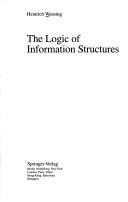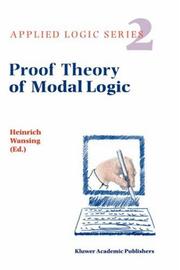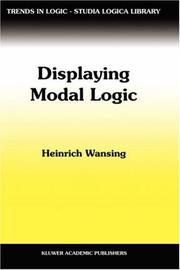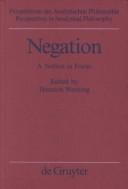| Listing 1 - 10 of 29 | << page >> |
Sort by
|

ISBN: 3540567348 0387567348 3540476423 9783540567349 Year: 1993 Volume: vol 681 *35 Publisher: Berlin Springer
Abstract | Keywords | Export | Availability | Bookmark
 Loading...
Loading...Choose an application
- Reference Manager
- EndNote
- RefWorks (Direct export to RefWorks)
This monograph gives a logical treatment of two central aspects of the concept of information, namely information processing and information structure. The structure of information is treated as a topic in model theory, while information processing is seen as an aspect of proof theory. A wide spectrum of substructural subsystems of intuitionistic propositional logic and of Nelson's constructive logic with strong negation is investigated. In particular, the problems of cut-elimination, functional completeness, and coding of proofs with lambda-terms are handled. Finally, an interpretation of these systems in terms of states of information and operations over these states is presented.
Artificial intelligence. Robotics. Simulation. Graphics --- Information systems --- AI(Artificial intelligence) --- Artificial intelligence --- Artificial thinking --- Artificiële intelligentie --- Computer science --- Electronic brains --- Informatica --- Informatique --- Intellectronics --- Intelligence [Artificial ] --- Intelligence artificielle --- Intelligent machines --- Kunstmatige intelligentie --- Logic [Symbolic and mathematical ] --- Logica [Symbolische en wiskundige ] --- Logique symbolique et mathémathique --- Machine intelligence --- Thinking [Artificial ] --- Cerveaux électroniques --- Machines intelligentes --- Pensée artificielle --- Artificial intelligence. --- Logic, Symbolic and mathematical. --- Artificial Intelligence. --- Mathematical Logic and Foundations. --- Algebra of logic --- Logic, Universal --- Mathematical logic --- Symbolic and mathematical logic --- Symbolic logic --- Mathematics --- Algebra, Abstract --- Metamathematics --- Set theory --- Syllogism --- AI (Artificial intelligence) --- Intelligence, Artificial --- Thinking, Artificial --- Bionics --- Cognitive science --- Digital computer simulation --- Electronic data processing --- Logic machines --- Machine theory --- Self-organizing systems --- Simulation methods --- Fifth generation computers --- Neural computers
Book
ISBN: 9783319110417 3319110403 9783319110400 3319110411 Year: 2015 Publisher: Cham : Springer International Publishing : Imprint: Springer,
Abstract | Keywords | Export | Availability | Bookmark
 Loading...
Loading...Choose an application
- Reference Manager
- EndNote
- RefWorks (Direct export to RefWorks)
This volume is dedicated to Prof. Dag Prawitz and his outstanding contributions to philosophical and mathematical logic. Prawitz's eminent contributions to structural proof theory, or general proof theory, as he calls it, and inference-based meaning theories have been extremely influential in the development of modern proof theory and anti-realistic semantics. In particular, Prawitz is the main author on natural deduction in addition to Gerhard Gentzen, who defined natural deduction in his PhD thesis published in 1934. The book opens with an introductory paper that surveys Prawitz's numerous contributions to proof theory and proof-theoretic semantics and puts his work into a somewhat broader perspective, both historically and systematically. Chapters include either in-depth studies of certain aspects of Dag Prawitz's work or address open research problems that are concerned with core issues in structural proof theory and range from philosophical essays to papers of a mathematical nature. Investigations into the necessity of thought and the theory of grounds and computational justifications as well as an examination of Prawitz's conception of the validity of inferences in the light of three “dogmas of proof-theoretic semantics” are included. More formal papers deal with the constructive behaviour of fragments of classical logic and fragments of the modal logic S4 among other topics. In addition, there are chapters about inversion principles, normalization of p roofs, and the notion of proof-theoretic harmony and other areas of a more mathematical persuasion. Dag Prawitz also writes a chapter in which he explains his current views on the epistemic dimension of proofs and addresses the question why some inferences succeed in conferring evidence on their conclusions when applied to premises for which one already possesses evidence.
Philosophy. --- Logic. --- Mathematical Logic and Foundations. --- Logics and Meanings of Programs. --- Philosophy (General). --- Logic design. --- Logic, Symbolic and mathematical. --- Logique --- Structure logique --- Logique symbolique et mathématique --- Philosophy --- Philosophy & Religion --- Logic --- Mental philosophy --- Algebra of logic --- Logic, Universal --- Mathematical logic --- Symbolic and mathematical logic --- Symbolic logic --- Design, Logic --- Design of logic systems --- Computer logic. --- Mathematical logic. --- Humanities --- Mathematics --- Algebra, Abstract --- Metamathematics --- Set theory --- Syllogism --- Digital electronics --- Electronic circuit design --- Logic circuits --- Machine theory --- Switching theory --- Argumentation --- Deduction (Logic) --- Deductive logic --- Dialectic (Logic) --- Logic, Deductive --- Intellect --- Psychology --- Science --- Reasoning --- Thought and thinking --- Methodology --- Computer science logic --- Logic, Symbolic and mathematical

ISBN: 0792341201 9780792341208 9048147204 9401727988 Year: 1996 Volume: v. 2 Publisher: Boston : Kluwer,
Abstract | Keywords | Export | Availability | Bookmark
 Loading...
Loading...Choose an application
- Reference Manager
- EndNote
- RefWorks (Direct export to RefWorks)
Modality (Logic) --- Proof theory --- Modalité (Logique) --- Théorie de la preuve --- Congresses. --- Congrès --- Modalité (Logique) --- Théorie de la preuve --- Congrès --- Modality (Logic) - Congresses. --- Proof theory - Congresses. --- Modalité (logique) --- Théorie de la démonstration

ISBN: 079235205X 9048150795 9401712808 9780792352051 Year: 1998 Publisher: Dordrecht Kluwer
Abstract | Keywords | Export | Availability | Bookmark
 Loading...
Loading...Choose an application
- Reference Manager
- EndNote
- RefWorks (Direct export to RefWorks)
This is the first comprehensive introduction to Display Logic in the context of generalized Gentzen calculi. After reviewing several standard and non-standard sequent-style proof systems for modal logics, the author carefully motivates and develops Display Logic, an important refinement of Gentzen's sequent calculus devised by N. Belnap. A general strong cut-elimination theorem is proved that covers a large class of display sequent calculi. Moreover, a proof-theoretic semantics of the modal operators is developed. Proof-theoretic characterizations are also obtained for the logical operations of systems associated with Tarskian structured consequence relations. These systems include constructive logics with strong negation. Using the embedding of intuitionistic logic in S4, display calculi are presented for certain subintuitionistic logics that may be used as monotonic base systems for semantics-based non-monotonic reasoning. Eventually, a first-order display calculus is defined. Its modal extension is general enough to avoid the provability of both the Barcan formula and its converse.
Modality (Logic) --- Modal logic --- Logic --- Nonclassical mathematical logic --- Bisimulation --- Modality (Logic). --- Logic. --- Artificial intelligence. --- Mathematical logic. --- Artificial Intelligence. --- Mathematical Logic and Foundations. --- Algebra of logic --- Logic, Universal --- Mathematical logic --- Symbolic and mathematical logic --- Symbolic logic --- Mathematics --- Algebra, Abstract --- Metamathematics --- Set theory --- Syllogism --- AI (Artificial intelligence) --- Artificial thinking --- Electronic brains --- Intellectronics --- Intelligence, Artificial --- Intelligent machines --- Machine intelligence --- Thinking, Artificial --- Bionics --- Cognitive science --- Digital computer simulation --- Electronic data processing --- Logic machines --- Machine theory --- Self-organizing systems --- Simulation methods --- Fifth generation computers --- Neural computers --- Argumentation --- Deduction (Logic) --- Deductive logic --- Dialectic (Logic) --- Logic, Deductive --- Intellect --- Philosophy --- Psychology --- Science --- Reasoning --- Thought and thinking --- Methodology --- LOGIQUE GENERALE --- LOGIQUE MODALE

ISBN: 3110147696 3110876809 9783110876802 9783110147698 Year: 1996 Volume: Bd. 7 Publisher: Berlin de Gruyter
Abstract | Keywords | Export | Availability | Bookmark
 Loading...
Loading...Choose an application
- Reference Manager
- EndNote
- RefWorks (Direct export to RefWorks)
Negation: A Notion in Focus (Perspectives in Analytical Philosophy, Bd 7)
Negation (Logic) --- Négation (Logique) --- Négation (Logique) --- Congresses. --- Congrès --- Negative propositions --- Congresses --- Judgment (Logic) --- Impersonal judgment --- Logic --- Reasoning
Digital
ISBN: 9783319110417 9783319110424 9783319110400 9783319360317 Year: 2015 Publisher: Cham Springer International Publishing
Abstract | Keywords | Export | Availability | Bookmark
 Loading...
Loading...Choose an application
- Reference Manager
- EndNote
- RefWorks (Direct export to RefWorks)
This volume is dedicated to Prof. Dag Prawitz and his outstanding contributions to philosophical and mathematical logic. Prawitz's eminent contributions to structural proof theory, or general proof theory, as he calls it, and inference-based meaning theories have been extremely influential in the development of modern proof theory and anti-realistic semantics. In particular, Prawitz is the main author on natural deduction in addition to Gerhard Gentzen, who defined natural deduction in his PhD thesis published in 1934. The book opens with an introductory paper that surveys Prawitz's numerous contributions to proof theory and proof-theoretic semantics and puts his work into a somewhat broader perspective, both historically and systematically. Chapters include either in-depth studies of certain aspects of Dag Prawitz's work or address open research problems that are concerned with core issues in structural proof theory and range from philosophical essays to papers of a mathematical nature. Investigations into the necessity of thought and the theory of grounds and computational justifications as well as an examination of Prawitz's conception of the validity of inferences in the light of three “dogmas of proof-theoretic semantics” are included. More formal papers deal with the constructive behaviour of fragments of classical logic and fragments of the modal logic S4 among other topics. In addition, there are chapters about inversion principles, normalization of p roofs, and the notion of proof-theoretic harmony and other areas of a more mathematical persuasion. Dag Prawitz also writes a chapter in which he explains his current views on the epistemic dimension of proofs and addresses the question why some inferences succeed in conferring evidence on their conclusions when applied to premises for which one already possesses evidence.
Mathematical logic --- Logic --- Computer science --- Computer. Automation --- computers --- programmeren (informatica) --- wiskunde --- logica
Book
Year: 2002 Publisher: Dordrecht Kluwer Academic
Abstract | Keywords | Export | Availability | Bookmark
 Loading...
Loading...Choose an application
- Reference Manager
- EndNote
- RefWorks (Direct export to RefWorks)
Book
ISBN: 3050027916 9783050027913 Year: 1995 Publisher: Berlin : Akad. Verl.,
Abstract | Keywords | Export | Availability | Bookmark
 Loading...
Loading...Choose an application
- Reference Manager
- EndNote
- RefWorks (Direct export to RefWorks)
Artificial intelligence. --- Reasoning. --- Logic, Symbolic and mathematical. --- Knowledge, Theory of. --- Philosophy --- Intelligence artificielle --- Raisonnement --- Logique symbolique et mathématique --- Théorie de la connaissance --- Philosophie --- Data processing. --- Informatique --- Artificial intelligence --- Logique symbolique et mathématique --- Théorie de la connaissance --- Logique mathématique --- Philosophy - Data processing. --- Logique --- Knowledge representation
Book
ISBN: 3030311368 303031135X Year: 2019 Publisher: Cham : Springer International Publishing : Imprint: Springer,
Abstract | Keywords | Export | Availability | Bookmark
 Loading...
Loading...Choose an application
- Reference Manager
- EndNote
- RefWorks (Direct export to RefWorks)
This edited volume collects essays on the four-valued logic known as Belnap-Dunn logic, or first-degree entailment logic (FDE). It also looks at various formal systems closely related to it. These include the strong Kleene logic and the Logic of Paradox. Inside, readers will find reprints of seminal papers written by the fathers of the field: Nuel Belnap and Michael Dunn. In addition, the collection also features a well-known but previously unpublished manuscript of Dunn, an interview with Belnap, and a new essay by Dunn. Besides the original, monumental papers, the book also includes research by leading scholars. They consider the extraordinary importance of Belnap-Dunn logic from several perspectives. They look at how, philosophically, it has served as a basic system of inconsistency-tolerant reasoning, as the core of underlying logics for theories based on dialetheism, and, more recently, for theories based on Buddhist philosophy. Coverage also explores its contributions to computer science, such as knowledge representation and information processing. This mix of seminal papers and insightful analysis by top scholars offers readers a comprehensive outlook on Belnap-Dunn logic and its related expansions, which have been agenda setting for the debate on philosophical logic as well as philosophy of logic. The book will also enhance further discussion on the philosophical issues related to nonclassical logics in general.
Entailment (Logic) --- Logic --- Logic. --- Mathematical logic. --- Mathematical Logic and Formal Languages. --- Mathematical Logic and Foundations. --- Algebra of logic --- Logic, Universal --- Mathematical logic --- Symbolic and mathematical logic --- Symbolic logic --- Mathematics --- Algebra, Abstract --- Metamathematics --- Set theory --- Syllogism --- Argumentation --- Deduction (Logic) --- Deductive logic --- Dialectic (Logic) --- Logic, Deductive --- Intellect --- Philosophy --- Psychology --- Science --- Reasoning --- Thought and thinking --- Methodology
Digital
ISBN: 9789400709072 Year: 2012 Publisher: Dordrecht Springer Netherlands
Abstract | Keywords | Export | Availability | Bookmark
 Loading...
Loading...Choose an application
- Reference Manager
- EndNote
- RefWorks (Direct export to RefWorks)
Philosophy --- Mathematical logic --- Logic --- filosofie --- wiskunde --- logica
| Listing 1 - 10 of 29 | << page >> |
Sort by
|

 Search
Search Feedback
Feedback About UniCat
About UniCat  Help
Help News
News